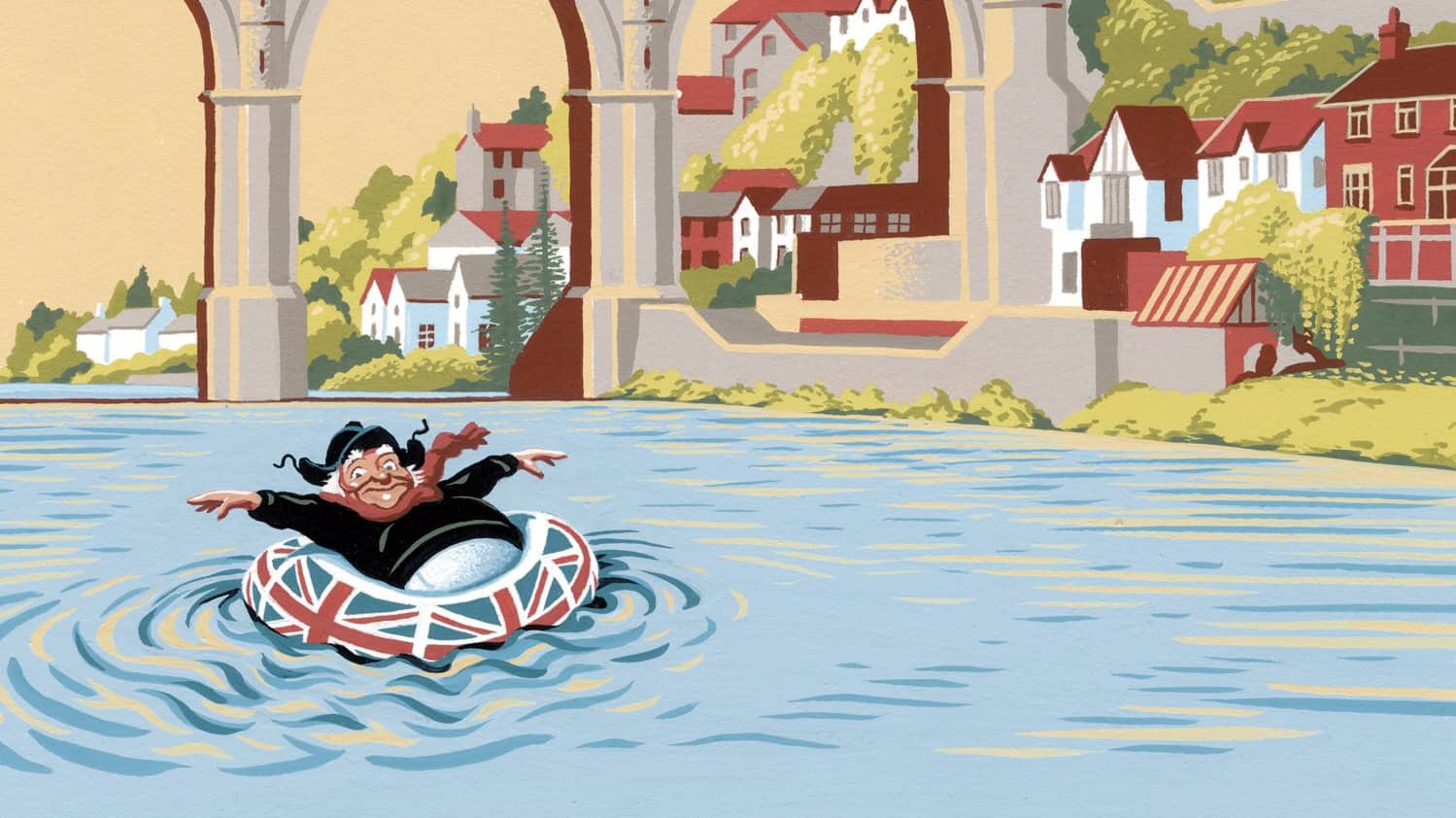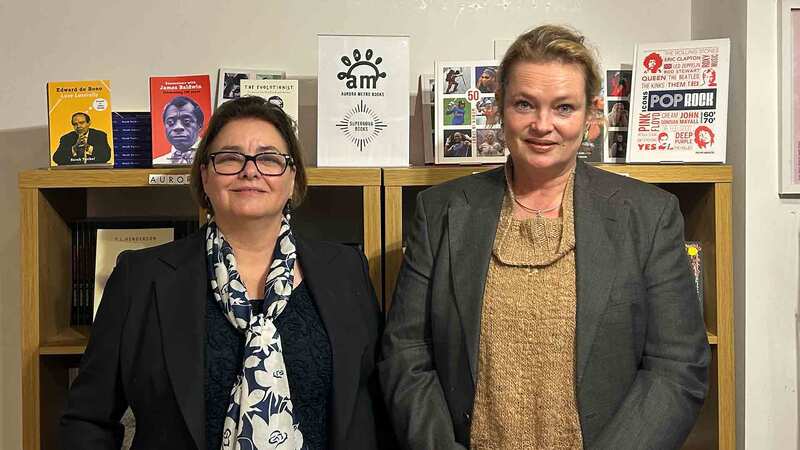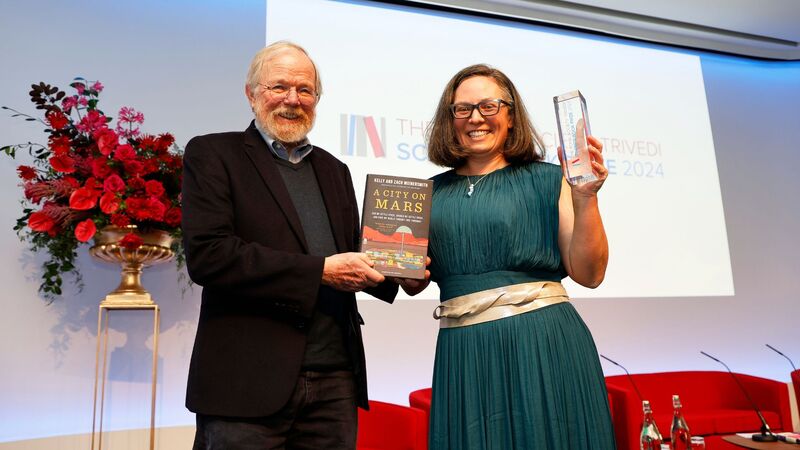You are viewing your 1 free article this month. Login to read more articles.
Notes From a Small Island: Extract
Extract from Bill Bryson’s Notes from a Small Island for World Book Night

My first sight of England was on a foggy March night in 1973 when I arrived on the midnight ferry from Calais. For twenty minutes, the terminal area was aswarm with activity as cars and lorries poured forth, customs people did their duties, and everyone made for the London road. Then abruptly all was silence and I wandered through sleeping, low-lit streets threaded with fog, just like in a Bulldog Drummond movie. It was rather wonderful having an English town all to myself.
The only mildly dismaying thing was that all the hotels and guesthouses appeared to be shut up for the night. I walked as far as the rail station, thinking I’d catch a train to London, but the station, too, was dark and shuttered. I was standing wondering what to do when I noticed a grey light of television filling an upstairs window of a guesthouse across the road. Hooray, I thought, someone awake, and hastened across, planning humble apologies to the kindly owner for the lateness of my arrival and imagining a cheery conversation which included the line, `Oh, but I couldn’t possibly ask you to feed me at this hour. No, honestly well, if you’re quite sure it’s no trouble, then perhaps just a roast beef sandwich and a large dill pickle with perhaps some potato salad and a bottle of beer.’ The front path was pitch dark and in my eagerness and un- familiarity with British doorways, I tripped on a step, crashing face-first into the door and sending half a dozen empty milk bottles clattering. Almost immediately the upstairs window opened.
`Who’s that?’ came a sharp voice.
I stepped back, rubbing my nose, and peered up at a silhouette with hair curlers. `Hello, I’m looking for a room,’ I said.
`We’re shut.’ `Oh.’ But what about my supper? `Try the Churchill. On the front.’ `On the front of what?’ I asked, but the window was already banging closed. The Churchill was sumptuous and well lit and appeared ready to receive visitors. Through a window I could see people in suits in a bar, looking elegant and suave, like characters from a Noel Coward play. I hesitated in the shadows, feeling like a street urchin. I was socially and sartorially ill-suited for such an establishment and anyway it was clearly beyond my meagre budget. Only the previous day, I had handed over an exceptionally plump wad of colourful francs to a beady-eyed Picardy hotelier in payment for one night in a lumpy bed and a plate of mysterious chasseur containing the bones of assorted small animals, much of which had to be secreted away in a large napkin in order not to appear impolite, and had deter- mined thenceforth to be more cautious with expenditures. So I turned reluctantly from the Churchill’s beckoning warmth and trudged off into the darkness.
Further along Marine Parade stood a shelter, open to the elements but roofed, and I decided that this was as good as I was going to get. With my backpack for a pillow, I lay down and drew my jacket tight around me. The bench was slatted and hard and studded with big roundheaded bolts that made reclining in comfort an impossibility ± doubt- less their intention. I lay for a long time listening to the sea washing over the shingle below, and eventually dropped off to a long, cold night of mumbled dreams in which I found myself being pursued over Arctic ice floes by a beady-eyed Frenchman with a catapult, a bag of bolts, and an uncanny aim, who thwacked me repeatedly in the buttocks and legs for stealing a linen napkin full of seepy food and leaving it at the back of a dresser drawer of my hotel room. I awoke with a gasp about three, stiff all over and quivering from cold. The fog had gone. The air was now still and clear, and the sky was bright with stars. A beacon from the lighthouse at the far end of the breakwater swept endlessly over the sea. It was all most fetching, but I was far too cold to appreciate it. I dug shiveringly through my backpack and extracted every potentially warming item I could find a flannel shirt, two sweaters, an extra pair of jeans. I used some woollen socks as mittens and put a pair of flannel boxer shorts on my head as a kind of desperate headwarmer, then sank heavily back onto the bench and waited patiently for death’s sweet kiss. Instead, I fell asleep.
I was awakened again by an abrupt bellow of foghorn, which nearly knocked me from my narrow perch, and sat up feeling wretched but fractionally less cold. The world was bathed in that milky pre-dawn light that seems to come from nowhere. Gulls wheeled and cried over the water. Beyond them, past the stone breakwater, a ferry, vast and well lit, slid regally out to sea. I sat there for some time, a young man with more on his mind than in it. Another booming moan from the ship’s foghorn passed over the water, re-exciting the irksome gulls. I took off my sock mittens and looked at my watch. It was 5.55 a.m. I looked at the receding ferry and wondered where anybody would be going at that hour. Where would I go at that hour? I picked up my backpack and shuffled off down the prom, to get some circulation going.
Near the Churchill, now itself peacefully sleeping, I came across an old guy walking a little dog. The dog was frantically trying to pee on every vertical surface and in consequence wasn’t so much walking as being dragged along on three legs.
The man nodded a good-morning as I drew level. `Might turn out nice,’ he announced, gazing hopefully at a sky that looked like a pile of wet towels. I asked him if there was a restaurant anywhere that might be open. He knew of a place not far away and directed me to it. `Best transport caff in Kent,’ he said.
`Transport calf?’ I repeated uncertainly, and retreated a couple of paces as I’d noticed his dog was straining desperately to moisten my leg.
`Very popular with the lorry drivers. They always know the best places, don’t they?’ He smiled amiably, then lowered his voice a fraction and leaned towards me as if about to share a confidence. `You might want to take them pants off your head before you go in.’
I clutched my head `Oh!’ and removed the forgotten boxer shorts with a blush. I tried to think of a succinct explanation, but the man was scanning the sky again.
`Definitely brightening up,’ he decided, and dragged his dog off in search of new uprights. I watched them go, then turned and walked off down the promenade as it began to spit with rain.
The cafe was outstanding lively and steamy and deliciously warm. I had a platter of eggs, beans, fried bread, bacon and sausage, with a side plate of bread and marge, and two cups of tea, all for 22p. Afterwards, feeling a new man, I emerged with a toothpick and a burp, and saun- tered happily through the streets, watching Dover come to life. It must be said that Dover was not vastly improved by daylight, but I liked it. I liked its small scale and cosy air, and the way everyone said `Good-morning,’ and `Hello,’ and `Dreadful weathe but it might brighten up,’ to everyone else, and the sense that this was just one more in a very long series of fundamentally cheerful, well- ordered, pleasantly uneventful days. No-one in the whole of Dover would have any particular reason to remember 21 March 1973, except for me and a handful of children born that day and possibly one old guy with a dog who had encountered a young fellow with underpants on his head.
I didn’t know how early one could decently begin asking for a room in England, so I thought I would leave it till mid-morning. With time on my hands, I made a thorough search for a guesthouse that looked attractive and quiet, but friendly and not too expensive, and at the stroke of ten o’clock presented myself on the doorstep of the one I had carefully selected, taking care not to discompose the milk bottles. It was a small hotel that was really a guesthouse, indeed was really a boarding-house. I don’t remember its name, but I well recall the proprietress, a formidable creature of late middle years called Mrs Smegma, who showed me to a room, then gave me a tour of the facilities and outlined the many complicated rules for residing there ± when breakfast was served, how to turn on the heater for the bath, which hours of the day I would have to vacate the premises and during which brief period a bath was permitted (these seemed, oddly, to coincide), how much notice I should give if I intended to receive a phone call or remain out after 10 p.m., how to flush the loo and use the loo brush, which materials were permitted in the bedroom waste- basket and which had to be carefully conveyed to the outside dustbin, where and how to wipe my feet at each point of entry, how to operate the three-bar fire in my bedroom and when that would be permitted (essentially, during an Ice Age). This was all bewilderingly new to me. Where I came from, you got a room in a motel, spent ten hours making a lavish and possibly irredeemable mess of it, and left early the next morning. This was like joining the Army.
`The minimum stay,’ Mrs Smegma went on, `is five nights at one pound a night, including full English breakfast.’
`Five nights?’ I said in a small gasp. I’d only intended to stay the one. What on earth was I going to do with myself in Dover for five days?
Mrs Smegma arched an eyebrow. `Were you hoping to stay longer?’
`No,’ I said. `No. As a matter of...’
`Good, because we have a party of Scottish pensioners coming for the weekend and it would have been awkward. Actually, quite impossible.’ She surveyed me critically, as she might a carpet stain, and considered if there was anything else she could do to make my life wretched. There was. `I’m going out shortly, so may I ask that you vacate your room within quarter of an hour?’
I was confused again. `I’m sorry, you want me to leave? I’ve just got here.’
`As per the house rules. You may return at four.’ She made to depart but then turned back. `Oh, and do be so good, would you, as to remove your counterpane each night. We’ve had some unfortunate occurrences with stains. If you do damage the counterpane, I will have to charge you. You do understand, of course?’
I nodded dumbly. And with that she was gone. I stood there, feeling lost and weary and far from home. I’d spent an hysterically uncomfortable night out of doors. My muscles ached, I was dented all over from sleeping on boltheads, and my skin was lightly oiled with the dirt and grit of two nations. I had sustained myself to this point with the thought that soon I would be immersed in a hot, soothing bath, followed by about fourteen hours of deep, peaceful, wallowing sleep, on plump pillows under a downy comforter.
As I stood there absorbing the realization that my nightmare, far from drawing to a close, was only just beginning, the door opened and Mrs Smegma was striding across the room to the strip light above the sink. She had shown me the correct method for turning it on `There’s no need to yank it. A gentle tug is sufficient’ ± and evidently remembered that she had left it burning. She turned it off now with what seemed to me a sharp yank, then gave me and the room a final suspicious once-over, and departed again.
When I was sure she was quite gone, I quietly locked the door, drew shut the curtains and had a pee in the sink. I dug a book from my backpack, then stood for a long minute by the door surveying the tidy, unfamiliar contents of my lonely room.
`And just what the fuck is a counterpane?’ I wondered in a small, unhappy voice and quietly took my leave.
What a different place Britain was in the spring of 1973. The pound was worth $2.46. Average weekly take-home pay was £30.11. A packet of crisps was 5p, a soft drink 8p, lipstick 45p, chocolate biscuits 12p, an iron £4.50, an electric kettle £7, a black-and-white TV £60, a colour TV £300, a radio £16, the average meal out £1. A scheduled airline ticket from New York to London cost £87.45 in winter, £124.95 in summer. You could have eight days in Tenerife on a Cook’s Golden Wings Holiday for £65 or fifteen days from £93. I know all this because before this trip I looked up the issue of The Times for 20 March 1973, the day I arrived in Dover, and it contained a full-page advertisement from the Government outlining how much most of these things cost and how they would be affected by a zippy new tax called VAT, which was to be introduced a week or so later. The gist of the advert was that while some things would go up in price with VAT, some things would also go down. (Ha!) I also recollect from my own dwindling cerebral resources that it cost 4p to send a postcard to America by air, 13p for a pint of beer, and 30p for the first Penguin book I ever bought (Billy Liar). Decimalization had just passed its second anniversary, but people were still converting in their heads `Good lord, that’s nearly six shillings!’ and you had to know that a sixpence was really worth 2p and that a guinea was £1.05.
A surprising number of headlines from that week could as easily appear today: `French air traffic controllers strike’, `White Paper calls for Ulster power sharing’, `Nuclear research laboratory to be closed’, `Storms disrupt rail services’ and that old standby of cricket reports, `England collapse’ (this time against Pakistan). But the most arrest- ing thing about the headlines from that dimly remem- bered week in 1973 was how much industrial unrest there was about: `Strike threat at British Gas Corporation’, `2,000 Civil Servants strike’, `No London edition of Daily Mirror’, `10,000 laid off after Chrysler men walk out’, `Unions plan crippling action for May Day’, `12,000 pupils get day off as teachers strike’ all this from a single week.
This was to be the year of the Opec crisis and the effective toppling of the Heath Government (though there wouldn’t be a general election until the following February). Before the year was out, there would be petrol rationing and mile-long queues at garages all over the country. Inflation would spiral up to 28 per cent. There would be acute shortages of toilet paper, sugar, electricity and coal, among much else. Half the nation would be on strike and the rest would be on three-day weeks. People would shop for Christmas presents in department stores lit by candles and watch in dismay as their television screens went blank after News at Ten by order of the Government. It would be the year of the Sunningdale Agreement, the Summerland disaster on the Isle of Man, the controversy over Sikhs and motorcycle helmets, Martina Navratilova’s debut at Wimbledon. It was the year that Britain entered the Common Market and it scarcely seems credible now - went to war with Iceland over cod (albeit in a mercifully wimpy, put-down-those- whitefish-or-we-might-just-shoot-across-your-bow sort of way). It would be, in short, one of the most extraordinary years in modern British history. Of course, I didn’t know this on that drizzly March morning in Dover.
I didn’t know anything really, which is a strangely wonderful position to be in. Everything that lay before me was new and mysterious and exciting in a way you can’t imagine. England was full of words I’d never heard before streaky bacon, short back and sides, Belisha beacon, serviettes, high tea, ice-cream cornet. I didn’t know how to pronounce `scone’ or `pasty’ or `Towcester’ or `Slough’. I had never heard of Tesco’s, Perthshire or Denbighshire, council houses, Morecambe and Wise, railway cuttings, Christmas crackers, bank holidays, seaside rock, milk floats, trunk calls, Scotch eggs, Morris Minors and Poppy Day. For all I knew, when a car had an L-plate on the back of it, it indicated that it was being driven by a leper. I didn’t have the faintest idea what GPO, LBW, GLC or OAPstood for. I was positively radiant with ignorance. The simplest transactions were a mystery to me. I saw a man in a newsagent’s ask for `twenty Number Six’ and receive cigarettes, and presumed for a long time afterwards that everything was ordered by number in a newsagent’s, like in a Chinese takeaway. I sat for half an hour in a pub before I realized that you had to fetch your own order, then tried the same thing in a tea-room and was told to sit down.
The tea-room lady called me love. All the shop ladies called me love and most of the men called me mate. I hadn’t been here twelve hours and already they loved me. And everyone ate the way I did. This was truly exciting. For years I’d been the despair of my mother because as a left- hander I politely declined to eat the American way, grasping the fork in your left hand to steady the food while cutting, then transferring it to your right hand to lift the food to your mouth. It all seemed ridiculously cumbersome, and here suddenly was a whole country that ate the way I did. And they drove on the left! This was paradise. Before the day was half over, I knew that this was where I wanted to be.
I spent a long day wandering aimlessly and happily along residential streets and shopping streets, eavesdropping on conversations at bus stops and street corners, looking with interest in the windows of greengrocers and butchers and fishmongers, reading fly-posters and planning applications, quietly absorbing. I climbed up to the castle to admire the view and watch the shuttling ferries, had a respectful look at the white cliffs and Old Town Gaol, and in the late afternoon on an impulse went to a movie, attracted by the prospect of warmth and by a poster depicting an array of scantily clad young ladies in seductive mood.
`Circle or stalls?’ said the ticket lady.
`No, Suburban Wife-Swap,’ I answered in a confused and furtive voice.
Inside, another new world opened for me. I saw my first cinema adverts, my first trailers presented in a British accent, my first British Board of Film Censors certificate (`This movie has been passed as suitable for Adults by Lord Harlech, who enjoyed it very much’), and discovered, to my small delight, that smoking was permitted in British cinemas and to hell with the fire risks. The film itself provided a rich fund of social and lexical information, as well as the welcome opportunity to rest my steaming feet and see a lot of attractive young women disporting in the altogether.
Among the many terms new to me were `dirty weekend’, `loo’, `complete pillock’, `au pair’, `semi-detached house’, `shirt-lifter’ and `swift shag against the cooker’, all of which have proved variously useful since. During the interval - another exciting new development for me - I had my first Kia-Ora, purchased from a monumentally bored young lady who had the remarkable ability to pull selected items from her illuminated tray and make change without ever removing her gaze from an imaginary spot in the middle distance. Afterwards I dined at a small Italian restaurant recommended by Pearl and Dean and returned contentedly to the guesthouse as night stole over Dover. It was altogether a thoroughly satisfying and illuminating day.
I’d intended to turn in early, but on the way to my room I noticed a door marked RESIDENT’S LOUNGE and put my head in. It was a large parlour, with easy chairs and a settee, all with starched antimacassars; a bookcase with a modest selection of jigsaw puzzles and paperback books; an occasional table with some well-thumbed magazines; and a large colour television. I switched on the TV and looked through the magazines while I waited for it to warm up. They were all women’s magazines, but they weren’t like the magazines my mother and sister read. The articles in my mother’s and sister’s magazines were always about sex and personal gratification. They had titles like `Eat Your Way to Multiple Orgasms’, `Office Sex - How to Get it’, `Tahiti: The Hot New Place for Sex’ and `Those Shrinking Rainforests - Are They Any Good for Sex?’ The British magazines addressed more modest aspirations. They had titles like `Knit Your Own Twinset’, `Money- Saving Button Offer’, `Make This Super Knitted Soap-Saver’ and `Summer’s Here - It’s Time for Mayonnaise!’
The programme that unfolded on the television was called Jason King. If you’re of a certain age and lacked a social life on Friday evenings in the early Seventies, you may recall that it involved a ridiculous rake in a poofy kaftan whom women unaccountably appeared to find alluring. I couldn’t decide whether to take hope from this or be depressed by it. The most remarkable thing about the programme was that, though I saw it only once more than twenty years ago, I have never lost the desire to work the fellow over with a baseball bat studded with nails.
Towards the end of the programme another resident came in, carrying a bowl of steaming water and a towel. He said, `Oh!’ in surprise when he saw me and took a seat by the window. He was thin and red-faced and filled the room with a smell of liniment. He looked like someone with unhealthy sexual ambitions, the sort of person your PE teacher warned that you would turn into if you masturbated too extravagantly (someone, in short, like your PE teacher). I couldn’t be sure, but I would almost have sworn that I had seen him buying a packet of fruit gums at Suburban Wife-Swap that afternoon. He looked stealthily at me, possibly thinking something along the same lines, then covered his head with the towel and lowered his face to the bowl, where it remained for much of the rest of the evening.
A few minutes later a bald-headed, middle-aged guy - a shoe salesman, I would have guessed - came in, said `Hullo!’ to me and `Evening, Richard,’ to the towelled head and took a seat beside me. Shortly after that we were joined by an older man with a walking-stick, a dicky leg and a gruff manner. He looked darkly at us all, nodded the most tinily precise of acknowledgements, and fell heavily into his seat, where he spent the next twenty minutes manoeuvring his leg this way and that, as if positioning a heavy piece of furniture. I gathered that these people were all long-term residents.
A sitcom came on called My Neighbour is a Darkie. I suppose that wasn’t its actual title, but that was the gist of it - that there was something richly comic in the notion of having black people living next door. It was full of lines like `Good lord, Gran, there’s a coloured chappie in your cupboard!’ and `Well, I couldn’t see him in the dark, could I?’ It was hopelessly moronic. The bald-headed guy beside me laughed until he was wiping tears from his eyes, and from under the towel there came occasional snorts of amusement, but the colonel, I noticed, never laughed. He simply stared at me, as if trying to remember what dark event from his past I was associated with. Every time I looked over, his eyes were fixed on me. It was unnerving.
A starburst briefly filled the screen, indicating an interval of adverts, which the bald-headed man used to quiz me in a friendly but confusingly disconnected way as to who I was and how I had fallen into their lives. He was delighted to find that I was American. `I’ve always wanted to see America,’ he said. `Tell me, do you have Woolworth’s there?’
`Well, actually, Woolworth’s is American.’
`You don’t say!’ he said. `Did you hear that, Colonel? Woolworth’s is American.’ The colonel seemed unmoved by this intelligence. `And what about cornflakes?’
`I beg your pardon?’ `Do you have cornflakes in America?’ `Well, actually, they’re American, too.’ `Never!’ I smiled weakly, and begged my legs to stand me up and take me out of there, but my lower body seemed oddly inert.
`Fancy! So what brings you to Britain then if you have cornflakes already?’
I looked at him to see if the question was serious, then embarked reluctantly and falteringly on a brief resume of my life to that point, but after a moment I realized that the programme had restarted and he wasn’t even pretending to listen, so I tailed off, and instead spent the whole of part two absorbing the heat of the colonel’s glare.
When the programme finished, I was about to hoist myself from the chair and bid this happy trio a warm adieu when the door opened and Mrs Smegma came in with a tray of tea things and a plate of biscuits of the sort that I believe are called teatime variety, and everyone stirred friskily to life, rubbing their hands keenly and saying, `Ooh, lovely.’ To this day, I remain impressed by the ability of Britons of all ages and social backgrounds to get genuinely excited by the prospect of a hot beverage.
`And how was World of Birds tonight, Colonel?’ asked Mrs Smegma as she handed the colonel a cup of tea and a biscuit.
`Couldn’t say,’ said the colonel archly. `The television - ’ he smacked me in the side of the head with a meaningful look `- was tuned to the other side.’ Mrs Smegma gave me a sharp look, too, in sympathy. I think they were sleeping together.
`World of Birds is the colonel’s favourite,’ she said to me in a tone that went some distance past hate, and handed me a cup of tea with a hard whitish biscuit.
I mewed some pitiful apology.
`It was puffins tonight,’ blurted the red-faced fellow, looking very pleased with himself.
Mrs Smegma stared at him for a moment as if surprised to find that he had the power of speech. `Puffins!’ she said and gave me a still more withering expression that asked how anyone could be so lacking in fundamental human decency. `The colonel adores puffins. Don’t you, Arthur?’ She was definitely sleeping with him.
`I do rather,’ said the colonel, biting unhappily into a chocolate bourbon.
In shame, I sipped my tea and nibbled at my biscuit. I had never had tea with milk in it before or a biscuit of such rocklike cheerlessness. It tasted like something you would give a budgie to strengthen its beak. After a minute the bald-headed guy leaned close to me and in a confiding whisper said, `You mustn’t mind the colonel. He hasn’t been the same since he lost his leg.’
`Well, I hope for his sake he soon finds it,’ I replied, hazarding a little sarcasm. The bald-headed guy guffawed at this and for one terrifying moment I thought he was going to share my little quip with the colonel and Mrs Smegma, but instead he thrust a meaty hand at me and introduced himself. I don’t remember his name now, but it was one of those names that only English people have - Colin Crapspray or Bertram Pantyshield or something similarly improbable. I gave a crooked smile, thinking he must be pulling my leg, and said, `You’re kidding.’
`Not at all,’ he replied coldly. `Why, do you find it amusing?’
`It’s just that it’s kind of . . . unusual.’
`Well, you may think so,’ he said and turned his attention to the colonel and Mrs Smegma, and I realized that I was now, and would doubtless forever remain, friendless in Dover.
Over the next two days, Mrs Smegma persecuted me mercilessly, while the others, I suspected, scouted evidence for her. She reproached me for not turning the light off in my room when I went out, for not putting the lid down in the toilet when I’d finished, for taking the colonel’s hot water - I’d no idea he had his own until he started rattling the doorknob and making aggrieved noises in the corridor - for ordering the full English breakfast two days running and then leaving the fried tomato both times. `I see you’ve left the fried tomato again,’ she said on the second occasion. I didn’t know quite what to say to this as it was incontestably true, so I simply furrowed my brow and joined her in staring at the offending item. I had actually been wondering for two days what it was. `May I request,’ she said in a voice heavy with pain and years of irritation, `that in future if you don’t require a fried tomato with your breakfast that you would be good enough to tell me.’
Abashed, I watched her go. `I thought it was a blood clot!’ I wanted to yell after her, but of course I said nothing and merely skulked from the room to the triumphant beams of my fellow residents.
After that, I stayed out of the house as much as I could. I went to the library and looked up `counterpane’ in a dictionary so that I might at least escape censure on that score. (I was astonished to find out what it was; for three days I’d been fiddling with the window.) Within the house, I tried to remain silent and inconspicuous. I even turned over quietly in my creaking bed. But no matter how hard I tried, I seemed fated to annoy. On the third after- noon as I crept in Mrs Smegma confronted me in the hallway with an empty cigarette packet, and demanded to know if it was I who had thrust it in the privet hedge. I began to understand why innocent people sign extravagant confessions in police stations. That evening, I forgot to turn off the water heater after a quick and stealthy bath and compounded the error by leaving strands of hair in the plughole. The next morning came the final humiliation. Mrs Smegma marched me wordlessly to the toilet and showed me a little turd that had not flushed away. We agreed that I should leave after breakfast.
I caught a fast train to London, and had not been back to Dover since.
Extracted from Notes from a Small Island by Bill Bryson, published by Transworld.















